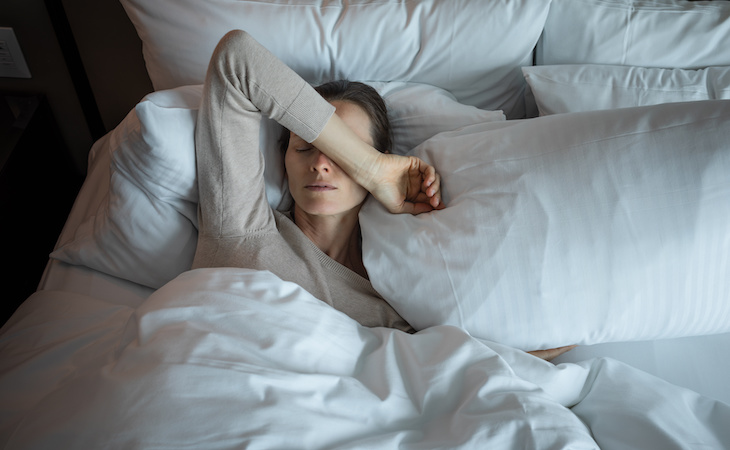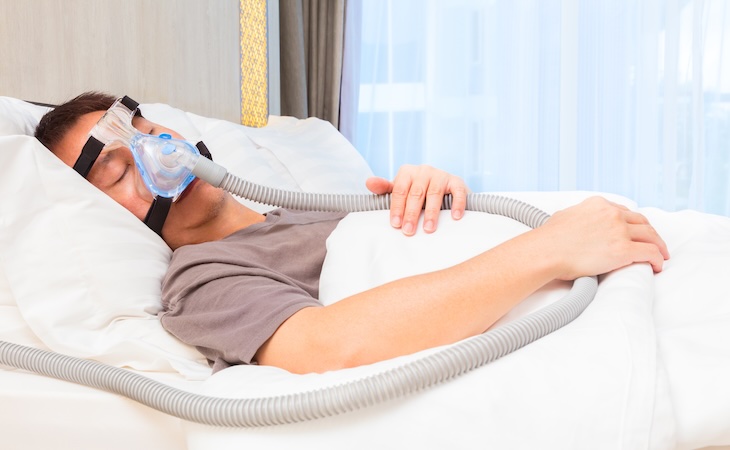While many of us may think that nightmares only happen to children after watching scary movies, these frightening dreams aren’t that uncommon in adults. Between 50% and 85% of adults say they have nightmares at least occasionally, according to the American Academy of Sleep Medicine.
Even if they’re infrequent, nightmares are unsettling. Here, learn what causes nightmares, as well as how to stop nightmares, so you can get the rest you need.
What causes nightmares
Why do we have nightmares? There are many possible explanations. The good news is, most of what causes nightmares are things you can control on your own or with the help of a medical professional.
Stress or anxiety
Any measure of anxiety is strongly associated with nightmares, says Deirdre Barrett, PhD, assistant professor of psychology and psychiatry at Harvard and author of Pandemic Dreams. Nightmares also contribute to anxiety. It’s still unclear how the two are connected, but this bidirectional relationship could lead to a vicious cycle. (Learn about how anxiety can cause maladaptive daydreaming disorder.)
PTSD
Almost three in four people who have experienced a traumatic event may have nightmares. “These dreams tend to be less dreamlike and much closer to waking-life events,” Barrett explains. Unlike other nightmares, which most often occur during REM (rapid eye movement) sleep, post-traumatic nightmares happen equally across all sleep stages, she adds. (Check out our guide to PTSD and sleep.)
Depression
In a study of almost 14,000 adults, 28% of participants who had severe depressive symptoms reported severe nightmares. More research is necessary to understand this connection.
Lack of sleep
Clearly, nightmares can lead to poor sleep. Unfortunately, insufficient sleep may also lead to nightmares.
“In general, if you are sleep-deprived, your body will prioritize non-REM sleep,” Barrett says, so your body can restore itself. However, if you’re very sleep-deprived, you may have “rebound sleep,” during which you experience more REM sleep, more dreaming, and more vivid dreams.
“You may have really glorious, wonderful dreams, but if you are nightmare-prone, you’re more likely to have nightmares or more vivid nightmares,” Barrett adds.
Sleep disorders
Untreated sleep apnea, narcolepsy, and restless legs syndrome can affect the quality of sleep and lead to nightmares.
Medications
Certain medications, including blood pressure medications, narcotics, and antidepressants, can lead to nightmares. And while some people report an increase in nightmares when they take melatonin, there is only one case study on this occurrence, so this isn’t proven.
Melatonin helps promote a regular sleep cycle, and Barrett believes having a healthy balance of REM and non-REM sleep would likely lead to fewer nightmares.
Alcohol abuse
Alcohol throws off the sleep cycle and suppresses REM sleep. “While a couple of drinks may help you nod off faster, you’re more likely to have more vivid dreams toward the morning, and if you’re nightmare-prone that will increase the vividness of morning dreams and may include nightmares,” Barrett says.
Additionally, if you stop drinking and go through alcohol withdrawal, your REM sleep will increase. You may at first experience “rebound sleep,” though, and have more nightmares during that time, Barrett adds.
Scary movies or books
Yes, watching Psycho or reading the latest Stephen King novel may cause nightmares. “Any imagery you see by day, especially at bedtime, has some chance of making it into your dreams,” Barrett says. So if you’re trying to have peaceful, happy dreams, choose your evening TV shows accordingly.
How to stop nightmares
While there’s no guarantee you can completely eliminate nightmares, you can take action to reduce the likelihood you’ll have them.
Improve your sleep hygiene
Set your bedroom up for sleep. Aim to make your room cool and dark, and your bed and pillows comfy. Then set yourself up for sleep by avoiding caffeine too late in the day, cutting off phone usage before bed, and skipping scary movies or upsetting news shows before bed.
Once you’re between the sheets, think about what pleasant thing you wish to dream about, such as a place you want to go on vacation or a favorite dream you have. In a study of college students, Barrett found that half of them were successful at dreaming about a topic that they chose.
Try therapy
If you have recurring, post-traumatic nightmares or are unusually distressed by your dreams, “it probably means you have a broader level of anxiety and maybe even a repressed trauma that the nightmare is reenacting but you’re not recognizing,” Barrett says.
Consider seeing a mental health professional. A type of cognitive behavioral therapy (CBT) called imagery rehearsal therapy (IRT) may help decrease the frequency and intensity of nightmares, particularly for those with PTSD. In IRT, while fully awake, “you think of an alternate ending for a recurring nightmare,” Barrett explains. You continue rescripting the dream until it’s no longer distressing.
Practice relaxation techniques
“If you are also anxious by day, the things you do for daytime anxiety tend to help with nightmares,” Barrett says. Those may include yoga, meditation, deep breathing, or journaling.
Get treated for your underlying condition
If you suspect you have sleep apnea or another sleep disorder, head to a doctor for a diagnosis and treatment plan. Addressing these conditions may help reduce nightmares.
Do nighttime panic attacks interfere with your sleep? Check out our guide to nocturnal panic attacks for tips on treating them.




